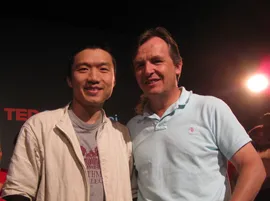Watch: Entrepreneur Feng He '03 on Crowd-funding Creativity in China in TED@Shanghai Talk
Entrepreneur Feng He '03 has a chance to be selected as a TED2013 speaker, thanks to a talk he gave in Shanghai this summer. TED2013 is billed as a global search that will highlight the thoughts and actions of unknown talent worldwide. He, whose talk, "Crowd funding creativity in China," is one of nearly 300 people that the public may vote for to speak at the event. The deadline is Aug. 31.
TED, which has ballooned from its beginnings as a conference in California, is now watched and delivered globally through video lectures and affiliated events. He spoke at one of 14 salons, from Bangalore to São Paulo, where TED welcomed auditions from the public to build the roster of speakers.
"I thought it would be a great opportunity," He says, "to present to the world the spirit of Chinese youth, of which I'd like to consider myself a representative." He, who graduated Phi Beta Kappa as a mathematics and computer science major, was selected as one of the 30 best applicants of the Shanghai salon.
In his talk, He, co-founder of Demo Hour, China's first and largest crowd-funding website, attributes the insufficiency of creativity coming from China to the lack of support for creative people. China, He argues, is teeming with creative ideas despite being the nexus of counterfeit good production and Demo Hour presents a new way of funding hundreds of innovative projects.

Feng He '03 (left) with TED chief curator Chris Anderson
Crowd-funding start-ups are platforms that appeal to the public to raise capital for projects. Anybody can pitch a creative project to the public and in return, offer rewards for financial backing. Creative ideas, otherwise lacking funding, can materialize if enough people contribute to reach the determined funding target.
For He, facilitating funding for projects is one aspect that draws him to the field of start-ups. Providing an outlet for creativity and self-expression is a greater priority.
"One thing I learned at Swarthmore is that there is a huge number of choices of human endeavors," he says. "In fact, this was the central theme of my Phi Beta Kappa initiation talk, delivered by my math professor Steve Maurer ['67]. What I want to achieve through Demo Hour is to give Chinese young people more opportunities to express themselves and do the things that inspire them."
In his talk, He explains the power of self-expression; it can be told in stories that resonates with the public, consequently drawing in hundreds to be part of a project's vision. An example of a successful Demo Hour project is that of two IT workers who left their city jobs to build a youth hostel in Lhasa, Tibet. They pitched for monetary donations and furnishings and, in return, would present funders with a lifetime membership to the hostel. Through Demo Hour they raised funds 100% above their target through over 2,500 pledges.
After Swarthmore, He became an associate at the Boston Consulting Group and obtained an MBA from the Stanford Graduate School of Business. Despite his credentials, when looking for funding to start up Demo Hour itself, He faced rejection from venture capitalists.
"The biggest doubt from investors was there would not be enough creative individuals to make Demo Hour a profitable business," he says. "It's a deeply held belief, even by the Chinese, that there is not enough creativity in China." Through Demo Hour, He hopes to highlight that these entrenched attitudes are misconceived. "I think it's simply that the investors, most of whom are in their 40s, are simply too out of touch with the youthful culture in China," He says.
During his presentation at TED@Shanghai, Feng sported a grey and garnet Swarthmore College t-shirt. As the voice and face of Demo Hour, He has based his signature attire on Swarthmore College apparel for media opportunities, including TV and magazine appearances.
"Deep down, I think I wanted to tell more people about Swarthmore and what an excellent education and experience I had there," he says. "Swarthmore encouraged me to be open, curious, and well-rounded, and these qualities are showing up in everything I do. It's not a coincidence that I wore the Swat T-shirt at the TED event. Swarthmore, and what it stands for - a broad, liberal arts education - comes up often in my conversation with friends and colleagues."



